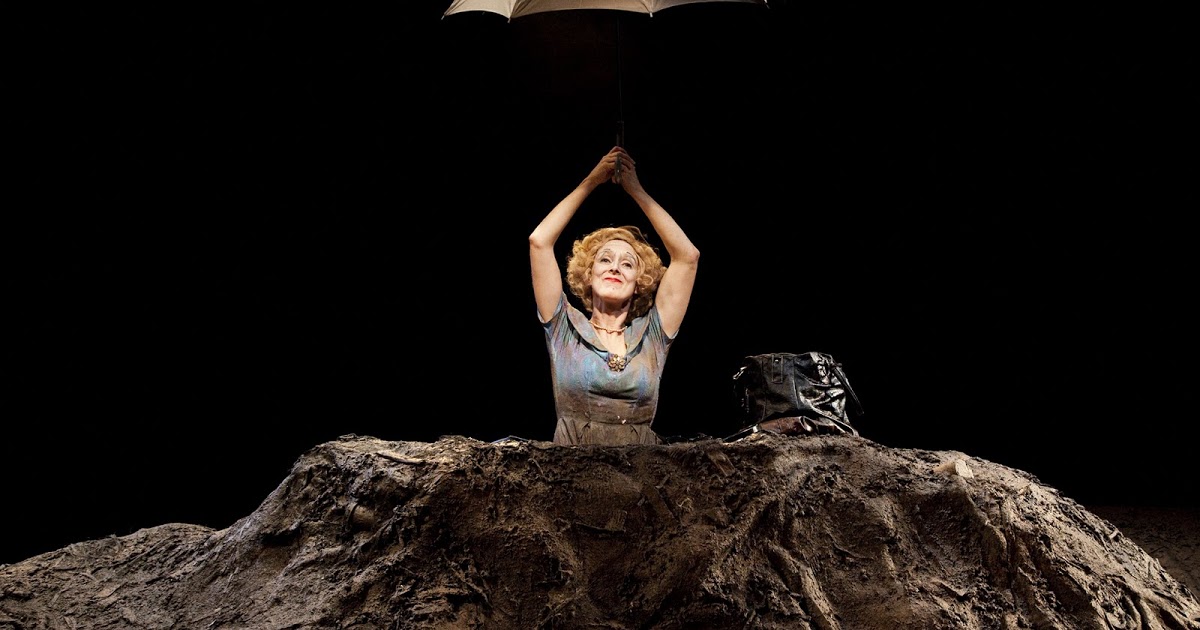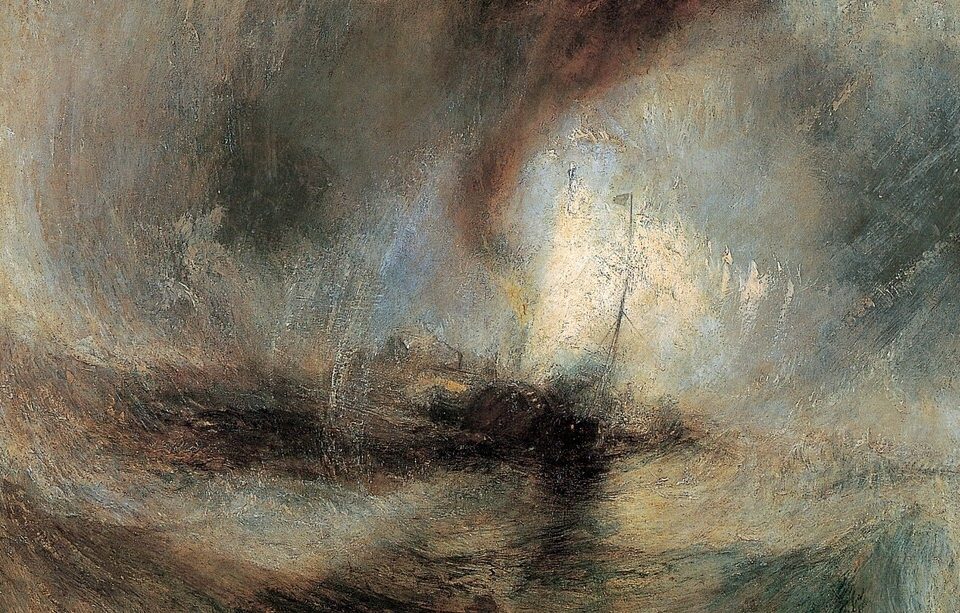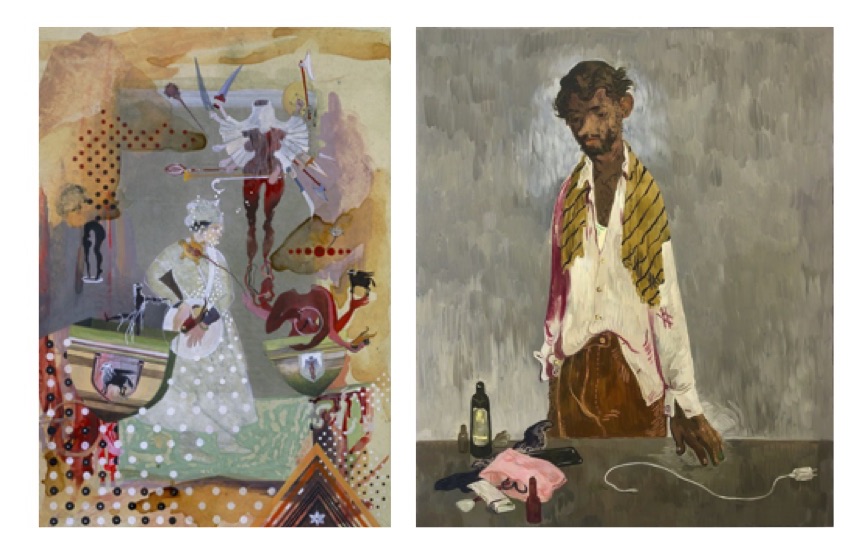By Claire Gleitman*
“Ah, yes, so little to say, so little to do, and the fear so great, certain days, of finding oneself…left, with hours still to run, before the bell for sleep, and nothing more to say, nothing more to do…” (Beckett, Happy Days 35). So Winnie observes, in Samuel Beckett’s 1961 play, Happy Days. The play focuses on a woman of about fifty who, for reasons unexplained, is trapped to her waist in a mound of earth. In that immobilized position, Winnie strives to make the best of things with limited resources, including a “capacious black bag” whose paltry contents are diminishing—the tube of toothpaste is flat, the medicine bottle is almost empty—and with very limited company (7). Winnie’s husband, who resides in a hole behind her mound, barely speaks to her, and otherwise no one save a lone ant has wandered anywhere near her in an unfathomably long time. Every moment of Winnie’s existence seems the same (“no better, no worse…no change” [9]); she knows that one day has drifted into another only because of the sound of a bell that signals that it is time to awaken or sleep. Nevertheless and despite these hellish circumstances, Winnie remains upbeat, determined to find ways to while away the time cheerfully and to see each day as a happy one—even when, in Act II, she finds that the earth has risen all the way to her neck.
I have been teaching Happy Days to students in my upper-division dramatic literature classes for nearly thirty years. My experience through these many years is that students usually struggle to feel more than detached irritation for Winnie and her plight. When they have been sympathetic, they have typically connected her to dotty elderly relatives or victims of Alzheimer’s disease. This past spring semester, though, was quite different. The gravity of the pandemic became clear on my campus while our students were away, in early March of 2020, on spring break. In response, the Ithaca College administration responded promptly, barring students from returning and lengthening spring break by an additional week to grant faculty time to “pivot” (one of the favored terms, along with “nimble,” in this time of nearly constant improvisation) in preparation for remote teaching for what turned out to be the rest of the term. Hence, in my Dramatic Literature II class—a 300-level survey of modern world drama—I waved a merry farewell to my students on March 4th as they went off for their breaks, blissfully unaware that the next time I would see them we would all be encased in our separate Zoom boxes, scattered across the country and in some cases across the world.
On that first Monday morning on March 23rd when we reconvened, I was nervous about the technology, anxious about whether I would be capable of handling basic Zoom functions like “share screen” and “breakout rooms,” and fearful that my students would respond to our bizarre new abnormal with skepticism and apathy. Hence, I was more than a little surprised when—promptly at 11 a.m. EST—they began to pop, not all at once but fairly expeditiously, onto my screen. Some were sprawled on their beds; others held pets, as if for comfort; some had created colorful virtual backgrounds that seemed to be threatening to devour their heads; one sat outside under a bright California sun (in Ithaca it was still snowing) while another, who was in Germany, appeared drowsy. They looked somber but attentive. We all agreed that we were incredibly happy to see one another. We spent some time checking in, as the students shared stories about their struggles, worries and disappointments. The majority were graduating seniors and—though it was not fully clear at this point that there would be no return to campus (IC was still holding out hopes for an April return); no final recitals, performances, or raucous celebrations; no commencement event—all of this was hovering on the horizon, just coming in to view. Not yet certain of the extent of their losses, the students were beginning to mourn. At the same time, they were trying to adjust to a life that was at once fraught with anxiety and thuddingly mundane, as they sat at home each day with “so little to say, so little to do.”
Thus, when it came time to, well, pivot, and focus our attention on the material at hand, in a deep sense we were already there. That material, entirely fortuitously, was Happy Days, the play we were due to begin discussing on March 23rd. (To be clear, I was not anticipating a pandemic when I planned my syllabus.) It bears repeating that the first class on Happy Days is generally a challenge. If students have prior familiarity with the Theatre of the Absurd, they tend to be convinced they dislike it. If they lack that familiarity, they are often frustrated by Winnie’s stream-of consciousness ramblings, her inexplicable predicament, the play’s refusal to locate its characters in a determinable time or place. And they typically regard Winnie’s tenaciously optimistic state of mind as nothing more than a weak-willed and complacent refusal to grapple with her terrible conditions. Winnie articulates this position herself at one point in the play, giving voice to the audience’s impatience, when she says: “Something says, Stop talking now, Winnie…and do something for a change, will you?” (40-41).
But in this particular semester, none of that occurred. Instead of bafflement, the class exhibited immediate investment and fascination. They dove into discussion, despite the annoying impediments of Zoom, with ferocious interest. And, instead of irritated denunciations of the main character, what I heard was a chorus of declarations that they saw themselves in Winnie, that they were Winnie. Indeed, they saw the play as an uncannily prescient portrait of our current circumstances. Noting Winnie’s meticulous attention to her appearance—“Keep yourself nice, Winnie, that’s what I always say, come what may, keep yourself nice” (41)—irrespective of the fact that no one, least of all her indifferent husband, is looking at her, several students confessed that they found themselves putting on lipstick or, even more ludicrously, perfume, before attending Zoom classes. It was a strategy, they recognized, for feigning normalcy and for giving shape to the shapeless days. As Winnie puts it, “these things tide one over” (24). In like fashion, one student reflected in a written response to the play, “My routine has been so disrupted…that I find myself falling back on simple things like brushing my teeth to remind me that everything is okay” (Alexa). Winnie’s tendency to roam disjointedly from thought to thought reminded them of themselves, as did her reliance on the few resources within her reach to fill the empty hours while not thinking about that emptiness. “With no responsibilities demanding my attention,” another student wrote, “my mind has pondered the good (‘When this is over I will never take social interaction for granted again’), the bad (‘Should I get a nose job?’), and the strange (I spent an hour on an Instagram account for a dog who wears sneakers)” (Sophia). Winnie’s version of this is to pore through her mental rolodex in search of barely remembered scraps of poetry which provide her, Eliot-like, with fragments to shore against her ruins, a consoling if tattered reminder of an erstwhile order. If Winnie has tangled lines from Shakespeare, Thomas Grey, and the “Rubáiyát of Omar Khayyam” to divert her, we—a less literate age—have Instagram.
Winnie’s tendency to speak of what she repeatedly calls “the old style” when she uses the word “day” was also recognizable to my class. They spoke with ironic nostalgia about the “before times” when one day seemed distinct from the next because things happened, one went places and saw people and did things. “ I find myself doing nearly the same thing every day…,” a class member observed, “distracting myself with what little provisions I have around me, talking to whoever will listen, even at the risk of irritating them, just to feel social, seen, still myself in any way” (Harleigh). In every detail she might have been describing Winnie, who longs for reassurance that she is “being heard” and carefully rations her meager possessions so as not to find herself marooned in time, with nothing to do “between the bell for waking and the bell for sleep” (21). To ward off despair, she wills herself into buoyancy– “Mustn’t complain” (14)—even when this means finding solace in what others might call horror: “No, one can do nothing ….That is what I find so wonderful, the way things…. things…so wonderful” (39). Instead of simply critiquing Winnie for her self-delusions, as so many other classes had done, my students likened themselves to her: “I know I don’t want to think about the full scope of the uncertain times we find ourselves in now. I think Beckett argues that we can’t, in order to keep going…We have to have something of a bell and a song to [endure] the grand absurdity of the world” (Harleigh). Almost every member of the class agreed that there is little more Winnie can do than cling to her rose-colored glasses as the earth ineluctably rises around her.
In truth, it was both moving and awful to see how intensely the students identified with Winnie. Arguably, one reason for undergraduates’ more typical resistance to the Theatre of the Absurd is that many plays in this tradition suggest that human beings exist within an enveloping absurdity that they are powerless to escape. We are time’s captives; we live (and die) in time. Estragon’s first line in Waiting for Godot—“Nothing to be done”—says it all, and though Vladimir may be merely “beginning to come round to that position,” it is the core principle of Beckett’s theatre (Godot 2). Even Godot’s Pozzo—the play’s prophet of movement—eventually comes round to the recognition that our lives are fleeting (“the light gleams an instant, then it’s night once more”) and we “go on” for no discernible purpose. But undergraduates are perched on the edge of adulthood and, by virtue of being in college, are explicitly engaged in the task of carving out a meaningful, forward-looking path—often in the form of a career that they hope will pave the way toward a successful and satisfying future. Why should they wish, in the midst of all this hectic and purposeful activity, to consider the possibility that their efforts might be meaningless from the perspective of an indifferent universe – just another strategy for not grappling with the rising dirt?
During these extraordinary times, though, my students found themselves watching helplessly as their carefully wrought plans dissolved around them: with each passing week, they saw not only eagerly anticipated college events cancelled, but internships and jobs—their meticulously crafted future–vanishing as well. The notion that “one can do nothing” to stem the tide of such losses suddenly felt all too real. “Before Winnie actually gets swallowed up by the mound,” one student pointed out, “she notes that if the mound were to cover her chest, it would be like no one had ever seen it at all …Just as Winnie’s body is erased by the mound, I feel like my entire college education is being erased by the circumstances of my last semester….In May, I will finish my classes but my life will essentially stay the same…There will not be big, momentous celebrations with all those that I love….I will simply stagnate while waiting for life to resume in the wake of a global pandemic” (Alexa). This fear of stagnation was expressed by others, who described themselves “[s]itting around waiting for a metaphorical bell or….a Zoom meeting,” and feeling time’s passage in a way that intensely driven 21st century undergraduates rarely have the time, for better and perhaps also for worse, to do (Frankie).
Of course, the students were cognizant of the fact that their situation was almost certainly not as dire as Winnie’s. Although both he and Winnie were seeking “to make the best of shit situations,” in one student’s words, he knew that in all likelihood his was a short-term problem that would fade long before his youth did, whereas Winnie’s antagonist is a more immediately looming mortality. Still, he wrote, frozen in place by the pandemic and with little to do other than to sit and think, “Death and existential thoughts constantly linger at the back of my mind to the point that at twenty I sit here stressing about what I’ll be doing in my old age, and what purpose I’ll have found, if one at all” (Jonah).
Yet the students did not give themselves over to fatalism; rather, they recognized the pandemic as at once beyond their control and the consequence of indisputably avoidable governmental failure and heedlessness. And this too they found ways to read, intelligently and persuasively, into Happy Days. Winnie and her husband Willie might be viewed as the original social distancers; they are always physically separated, to some degree perforce but also by choice– that is to say, by his choice, as Winnie cannot move. Willie can crawl, and in virtually every other respect too he is written in sharp contrast to his wife. While she chatters away, he barely speaks, and his attitude is as persistently grim as hers is chipper. Most strikingly, he largely ignores and scorns her frequent requests for his attention. She longs for him to “come round and live this side of the mound” where she could see him, or at least for him to look at and speak to her, but most of the time he refuses (46). More than one student drew connections between Willie’s treatment of Winnie and “the neglect of our government right now, who by denying the severity of the situation…have actively piled more dirt on our heads, and don’t seem too inclined to dig us out” (Harleigh). This idea was echoed by others: “Winnie spends the entire play trying…to be heard by Willie and I feel like that is how many Americans are feeling about our federal administration…It feels as if the people who are supposed to care about us and protect us are neglecting us and [are] willing to sacrifice our wellbeing” (Alexa).
The students were also alert to the gendered implications of Winnie’s predicament, exacerbated by her age: she recalls that another married couple wandered past her mound at some point in the amorphous past and the male in the couple asked, “What good is she to him like that?” (43). Buried to her waist, Winnie is unavailable to Willie sexually and she is post-menopausal, more useless (in the male observer’s eyes) than the ant carrying eggs that she notices crawling on her mound. Still, she sings love songs and longs for spousal attention that was always predicated on her prettiness. She quotes tearfully from what appears to have been Willie’s wedding toast, although because she does so in fragmented fashion we must fill in the missing words: “(She…frees a strand of hair from under hat, draws it towards eye…) Golden you called it, that day when the last guest was gone….to your golden….may it never…(voice breaks)” (24). It struck my students as ironic that Willie in effect asks time to stand still, so that Winnie can remain eternally youthful with hair that never greys. She cannot grant him this, and yet in a sense time does stand still for Winnie, as it seemed to be standing still for them, even as it moves forward inexorably. As Winnie poignantly expresses this phenomenon: “To have been always what I am – and so changed from what I was” (51). This is what it means to live in time; we feel the constancy of our own selfhood even as the moments and the days and the years advance, pulling us relentlessly along with them. My students had never felt this so acutely as they did when the world came to a grinding halt – and yet time marched on.
If Happy Days appeared to capture so many aspects of a widely shared human experience occurring decades after Beckett’s death, it also seemed clairvoyant about climate change, another global catastrophe that my class felt the playwright predicted “with spooky accuracy” (Maya). Winnie’s mound sits within an “[e]xpanse of scorched grass” (7). She and Willie do their best to survive beneath a “hellish sun” that never sets and whose rays are so intense that Winnie worries about Willie’s bald head getting “singed” (25; 14). The couple exists in a wilderness where nearly everything has died off and, when Winnie’s parasol suddenly bursts into flames, she is not especially surprised (36). As my student remarked wistfully, “Happy Days reminds us that if we had mitigated climate change before we were buried up to our ‘heads’ in it, the future would (offer) far brighter prospects” (Maya).
Lest it appear that reading Happy Days cast a shadow of unmitigated gloom over my classroom, or rather my Zoom screen, I should make clear that the great majority of my students found these correspondences and the play itself troubling but also deeply consoling, as the following commentary suggests: “As someone who has now read Happy Days, I can…say with complete honesty that this play is entirely too relatable and I….have found immense comfort in it in this time” (Alexa). Indeed, Happy Days turned out to be something I could not have anticipated that I would need when I planned my course: that is, the ideal play to help my class take stock during a time of enormous loneliness, tedium, loss and fear. As their own lives came to a standstill, students were able to see Winnie, and through her themselves, with striking nuance and compassion. More than that, we were able to think together about how the context in which we apprehend a text can shape and enrich our perceptions so that aspects of it come alive to us in ways that might have been less tangible in the “before times.” Encountering Happy Days during the pandemic transformed Beckett’s Winnie from a character the students might have found alienating into a startlingly recognizable mirror image of their own alienating experience.
In short, Beckett’s play helped my students, at the most difficult moment many of them had yet endured in their young lives, to articulate how they were coping, why they were struggling, and what they were grieving. Seeing themselves in Winnie made them feel less alone and also lucky for what they had—almost to a one they noted that, unlike Winnie, they had family to support and care for them–while granting them permission to bemoan what they had lost. The play sharpened their sense of the ways in which human beings are simultaneously at the mercy of forces they cannot always avert (time, disease, governmental recklessness and neglect) and the possessors of imaginations that can turn out to be their route to power, even in moments when it appears that they are powerless. As one student wrote, “We have ceased to measure time because there is nowhere to go and no one to see. Hour to hour and day to day, time seems to slip by without importance. But this is arguably the most important time in modern history. In the years to come, books will be written, documentaries will be made, and stories will be told about the coronavirus and its earth-shattering impact.” She commended Winnie for her “intense mental gymnastics,” arguing that Winnie only appears to do nothing, though she might do far more if she had the wherewithal in her dire circumstances to add outrage to her mental arsenal (Sophia). And with that thought, with the recognition that “thinking, analyzing,” imagining and questioning constitute among the most meaningful and transformative activities available to us–even in extremis, even when we can do nothing for a time but stand still–a true humanist can be said to have been born.
Works Cited:
Samuel Beckett, Happy Days. NY: Grove Press, 1961.
Samuel Beckett, Waiting for Godot. NY: Grove Press, 2011.
Claire Gleitman is a Professor, Department of English and coordinator of the Women’s and Gender Studies Program at Ithaca College. She can be reached at gleitman@ithaca.edu.




